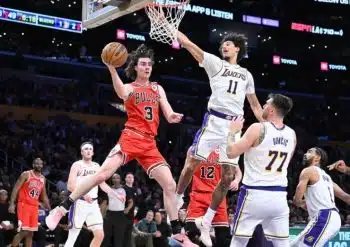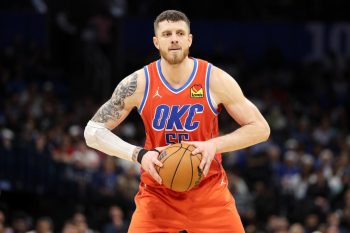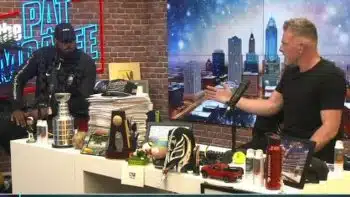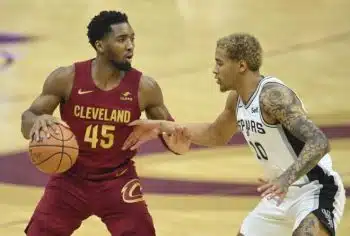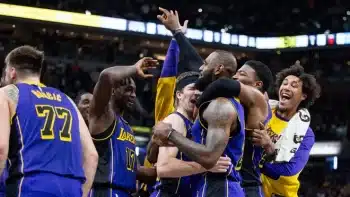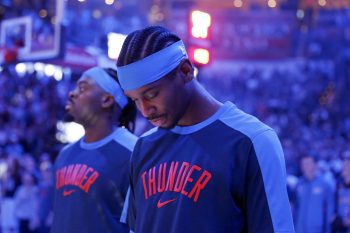NBA
NBA PM: Can Upshaw Succeed in NBA?
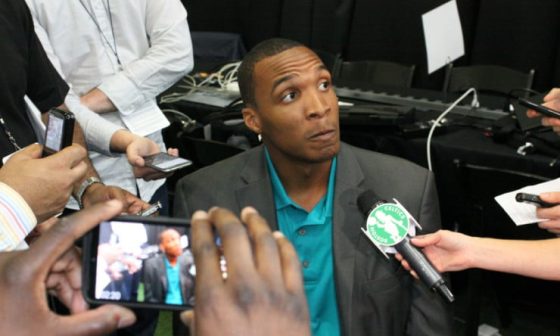
Can Upshaw Succeed in the NBA?
Take a glance at Robert Upshaw’s numbers and it seems clear that he should be in the NBA.
The center prospect averaged 10.9 points (on 59.3 percent shooting from the field), 8.2 rebounds and 4.5 blocks this season with the Washington Huskies despite only playing 24.9 minutes per game and often coming off the bench. His per-40 stats were 17.6 points, 13.1 rebounds and 7.2 blocks. At the 2015 NBA Draft Combine, he measured in at an impressive 7’0 with a 7’5.5 wingspan and 9’5 standing reach.
However, there is one extremely important number that has understandably hurt the big man’s draft stock and scared away some potential NBA suitors: Upshaw was dismissed from two collegiate teams in three years due to substance abuse.
In 2013, Fresno State decided to part ways with Upshaw after his freshman year due to drug use. He had been suspended multiple times before the team decided to dismiss him. That summer, Upshaw spent time at a Houston treatment program run by former NBA player John Lucas, who often helps athletes in this position since he had similar struggles earlier in his life. The hope was that the talented but troubled big man could get the help he needed and then put these issues behind him.
Upshaw received a second chance at the college level when Washington allowed him to join their team for the 2014-15 season. He filled the stat sheet and climbed draft boards early in the season with his solid play on both ends of the floor. However, he was dismissed from the program in late January for similar issues. According to reports, Upshaw failed multiple drug tests while at Washington (just as he did at Fresno State).
Now, the question is, where does Upshaw go from here? His substance abuse is obviously a concern and it must be treated and under control in order for him to play in the NBA. At the same time, as plenty of people around the NBA will say, he’s a talented player. Executives were intrigued enough by Upshaw’s ability that he was invited to the NBA Draft Combine in Chicago.
Teams are doing their homework on him and Upshaw has received interest from a number of franchises. He has been projected as a late first rounder or early second rounder by some credible mock drafts. Upshaw spent his time at the Combine trying to assure teams that his life is now in order and his issues are behind him.
“I have a clear understanding of what’s going on in my life and, unlike most people in my situation, I’ve been able to identify the wrongs and I’ve been able to go through the experiences and I’ve been able to learn from them,” Upshaw said. “Everybody makes mistakes. Regardless of if it was the mistakes I made or the mistakes I’m going to make in life, we’re going to make mistakes and at the end of the day I’ve learned that. I’ve made my mistakes, but I’m still going.
“I hit my rock bottom at Washington when I left. It was a surprise. I just didn’t think it was going to happen. I thought I was doing so well and that was going to keep me around, but I made a lot of bad decisions before that. I hit rock bottom and I just realized I’m 21 years old, I got a family to feed and the food is not going to put itself on the table. So I have one more opportunity to accomplish my goals and to be able to take care of my family, so I’m going to sacrifice to do everything I can possible.”
Upshaw has received support from a number of current and former NBA players.
“One person that I’ve talked to a lot is Spencer Hawes,” Upshaw said. “A lot of the Seattle guys – Jamal Crawford, Will Conroy, Brandon Roy, Tony Wroten, Nate Robinson, a lot of those guys – kind of took me under their wing. I played pick-up with them and they just talked to me about the game and how the game goes and how everything is at the next level, and I took a lot from that. I think that’s why I had the success at Washington at the time. Even after I had my struggles, they still talked to me and they still gave me advice.”
Picking Upshaw is obviously a risk, and NBA teams will have to determine if he’s really changed his life or if he’s just saying all of the right things to get drafted.
When asked what he can bring to an NBA team, Upshaw made a bold statement.
“I bring a defensive presence; I consider myself to be the best defensive player in the country, so I feel like I can go in immediately and be a presence,” he said.
Upshaw led the nation in blocks at the time of his dismissal from Washington.
“I actually really took the time this year to get better [at blocking shots],” Upshaw said. “I couldn’t even block shots in practice – I’ll be honest – the guards knew when [I’d] come in. I had struggles, but in the game we had a lot of guys who couldn’t guard the ball, so they’d get beat baseline or something and I’d just come over and help so it’s just a natural instinct. Once I started to break down film, I started to really look at, ‘Okay, I really need to be over here in my rotation.’ I started to break down teams’ defenses, and then it became something that just clicked like that.”
He feels his defensive skills can translate well to the league.
“[NBA defense] is just more intense, it’s more sped up, you have to read and react, you have to be there,” Upshaw said. “There are a lot of broken defensive plays in college and there are a lot of miscommunications. I think at the next level, there’s a small amount of room for error so you just got to boost it up even more.”
There have also been some questions about Upshaw’s character, but he tried to remove any of those concerns at the Combine as well.
“I’m a great teammate,” he said. “I bring character. I’m a great guy on the court, love my teammates, love the guys that I play basketball with. … I feel like with the person I am now and with the person I can be in the future, I feel like I’m a great asset to a team. I bring a lot of positives to a team and I feel like I’d be a great fit for any team.”
In addition to saying the right things, Upshaw will need to showcase his game for teams. He has yet to do that, as he didn’t participate in five-on-five action at the Combine. He admits that his conditioning is an issue, and that’s something he’ll have to improve quickly.
“I’ve been out for a while so I’m just getting back to it,” Upshaw said. “But I feel like once I’m at the top of my conditioning, I’ll be unstoppable.”
It’ll be very interesting to see where Upshaw goes on draft night. On one hand, his numbers were impressive and he has shown flashes of his talent. On the other hand, picking him is risky given his troubles. Teams will have to do their homework if they’re considering him, and ensure that he’s on the right path and not just saying what they want to hear.
Hopefully Upshaw can put his past behind him and start realizing his full potential. He understands that he is fortunate to have received so many chances, and he says he wants to take advantage of this latest (and perhaps last) basketball opportunity.
“To be here is a blessing,” Upshaw said. “After being through what I’ve been through in the past three years, to still be here to this day [is a blessing]. Whether [I’m] drafted in the first or second or walk onto a team or have to struggle to get my way there, I’m going to fight and do whatever I have to do to get to the next level.”
NBA Announces All-Defensive Teams
Today, the NBA announced the All-Defensive First Team and Second Team.
The NBA All-Defensive First Team includes forward Kawhi Leonard of the San Antonio Spurs (242 points, 116 First Team votes), forward Draymond Green of the Golden State Warriors (229 points, 107 First Team votes), guard Tony Allen of the Memphis Grizzlies (207 points, 88 First Team votes), center DeAndre Jordan of the Los Angeles Clippers (187 points, 84 First Team votes) and guard Chris Paul of the Clippers (170 points, 67 First Team votes).
The NBA All-Defensive Second Team consists of New Orleans Pelicans forward Anthony Davis (47 First Team votes), Chicago Bulls guard Jimmy Butler (44), Warriors center Andrew Bogut (33), Washington Wizards guard John Wall (7) and Spurs forward Tim Duncan (5).
Players were awarded two points for each First Team vote and one point for each Second Team vote. Voters were asked to select two guards, two forwards and one center for each team, choosing players at the position they play regularly.
